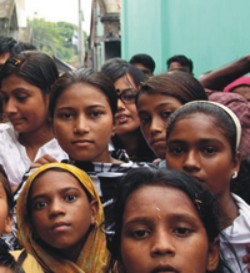Human Rights monitor
When sexual harassment leads to suicide
Syeda Sakina Mumtaz Huq
 Sexual harassment against girls and women in Bangladesh is turning deadly: 28 women have committed suicide this year and another seven attempted it to escape frequent sexual harassment, says a Dhaka-based human rights organization, Ain O Salish Kendra (ASK).
Sexual harassment against girls and women in Bangladesh is turning deadly: 28 women have committed suicide this year and another seven attempted it to escape frequent sexual harassment, says a Dhaka-based human rights organization, Ain O Salish Kendra (ASK).
A father also committed suicide fearing social insult after his daughter was harassed and in other cases, stalkers killed three women, reported the NGO.
According to the Bangladesh National Women Lawyers' Association, almost 90 percent of girls aged 10-18 years have experienced what is known locally as “eve-teasing”, where boys intercept girls on the street, and shout obscenities, laugh at them or grab their clothes.
Eve-teasing has escalated ever since girls and women started entering formal education and employment in larger numbers in the 1980s, said Paul Subrata Malakar, from the NGO Plan International, in Dhaka.
Impacts
On 16 November, Sharmin, a 20-year-old student in Dinanjpur, (400km northwest of Dhaka), was returning home from college when a stalker forcibly held her hand and tried to hug her.
Since then, her parents say, she has stopped going to college.
“As sexual violence is happening on the way to school, it will panic parents and the parents will discourage their daughters from going to school,” said Rekha Saha, director of Dhaka-based NGO, Steps Towards Development.
In a country where 1.5 million girls (out of 10.4 million eligible) are not enrolled in school, an unknown number are avoiding school out of fear and humiliation of daily harassment.
Since January of this year, ASK has received 61 complaints from girls who had dropped out of school because they were harassed.
Moreover, in a country where more than 64 percent of girls marry before they are 18, some parents have pushed eve-teasing victims into early marriage to “protect” their honour and safety, said Malakar and Saha.
Causes
Ishrat Shamim, a gender studies expert and professor of sociology at Dhaka University, is calling for further investigation into the causes of the rise in violence against women.
“[The] mindset of both men and women is important. Many men, also women, believe women are second-class citizens after men. [While] women's participation in education, the labour force and other activities is increasing, men are not yet to get used to seeing women outside the home.”
Changing this mindset has proven to be a long-standing obstacle.
“In a male-dominant society, eve-teasing can be viewed as a rite of passage for boys on their way to becoming men,” said Malakar of Plan International. “All the steps [we take] will be futile unless the male segment of the society change its patriarchal mindset.”
The fact that girls are hesitant to report violence has made studying and fighting the phenomenon even more difficult.
“Many girls believe that if they complain, their parents and community leaders will blame her,” said Sayeda*, a 14-year-old student in the capital, Dhaka.
Source: IRIN, the humanitarian news and analysis service of the UN Office for the Coordination of Humanitarian Affairs